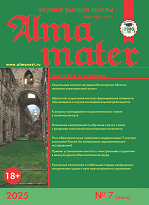Tatiana Yu. Kirilina, Dr of Sociology, Professor, Department of Humanitarian and Social Disciplines, Technological University named after twice Hero of the Soviet Union, Pilot-cosmonaut A.A. Leonov”, Korolev city, Russia, e-mail: tykirilina@gmail.com
The article analyzes the ideas of modern Russian youth about education as a channel of social mobility and the possibilities of improving social status with the help of this social elevator. The empirical basis of the study was the results of a survey of 462 respondents aged 14 to 35 years. More than three quarters of the respondents are not satisfied with their social status and would like to raise it. The young survey participants believe that, first of all, education and science allow you to succeed in modern Russian society if you rely only on your abilities.
In modern Russia, a low level of education is a barrier to upward social mobility. A good education is necessary for access to managerial positions and prestigious professions. Therefore, the vast majority of respondents plan to further improve their education level. At the same time, higher education in modern Russia is not, as in most European countries, a guarantee of power and high income.
Keywords: education, social institution, social mobility, upward vertical mobility, social elevators, youth
References
1. Bourdieu, P. (2002) Forms of capital. Economic Sociology [Electronic journal www.ecsoc.msses.ru]. Vol. 3. No. 5. Pp. 60–74
2. Report on the implementation of state policy in the field of higher education and related additional professional education in 2024 [Electronic resource]. URL: http://static.government.ru/media/files/9FSaRZ2GJ7GRZc1hTICXDQAV9orIaXtI... (accessed on: 27.02.2025).
3. European Social Research (ESS) URL: https://stessrelpubprodwe.blob.core.windows.net/data/round8/survey/ESS8_... (accessed on: 27.02.2025).
4. Zborovsky, G.E., Ambarova, P.A. (2019) Sociology of higher education: monograph. Yekaterinburg: University of the Humanities. 539 p.
5. Indicators of education: 2025: a statistical collection (2025) / N.V. Bondarenko, T.A. Varlamova, L.M. Gokhberg et al.; National research. University of Higher School of Economics. Moscow: ISIEZ HSE. 452 p.
6. Results of the Russian Population Census 2020 [Electronic resource]. URL: https://rosstat.gov.ru/storage/mediabank/Tom3_tab1_VPN-2020.xlsx (accessed on: 01.03.2025).
7. Kolesnikova, N.D. (2017) How education and position affect salary. Higher School of Economics. [Electronic resource]. URL: https://iq.hse.ru/news/213146392.html (accessed on: 01.03.2025).
8. Lyotard, J.-F. (1998) The state of postmodernity / Translated from the French by H.A. Shmatko. Moscow: Institute of Experimental Sociology Press; St. Petersburg: Aleteya. 160 p.
9. Education in numbers: 2022: a short statistical collection (2023) / T.A. Varlamova, L.M. Gokhberg, O.K. Ozerova et al.; National research. University of Higher School of Economics. Moscow: ISIEZ HSE. 132 p.
10. Prokhoda, V.A. (2019) Education as a channel of intergenerational social mobility in Russia and other European countries. Vestnik of Moscow University. Series 7. Philosophy. No. 3. Pp. 65–80.
11. Sorokin, P.A. (2005) Social mobility / Transl. from the English by M.V. Sokolova. Moscow: Academia, LVS. — XX, 588 p.
12. Sorokin, P.A. (1992) The man. Civilization. Society. Moscow, Publishing House of Political Literature. Pp. 297–307, Pp. 373–423.











.png)






